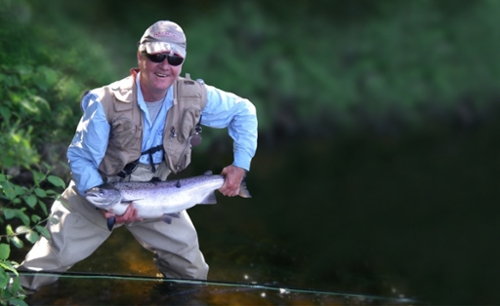Commentary Rivers Institute puts science into action
Author: Communications
Posted on Feb 18, 2016
Category: UNB Fredericton , UNB Saint John
Commentary: Rivers Institute puts science into action
Rick Cunjak
Our mission at the Canadian Rivers Institute is to ‘make every river a healthy river.’
As vision statements go, it sounds simple enough. In practise, it’s an incredibly complex undertaking - but it’s one of the reasons our institute has remained at the forefront of river science around the world, and why we’re proud to celebrate our 15th anniversary this month.
Hosted by the University of New Brunswick’s campuses in Saint John and Fredericton, the CRI is an internationally-recognized collaboration of academics, regulators, industry, and non-government agencies who are committed to advancing science in order to meet society’s priority water issues.
We have 19 science directors located across Canada and we lead or assist projects in more than a dozen countries.
As my colleague and fellow founder Dr. Allen Curry describes it, we’re a bit like the ‘Ghostbusters’ of the aquatic sciences world.
“I’ve always thought the way the world should look at the Canadian Rivers Institute is when there is a question,”Curry told me recently.“‘I have a problem, how do I deal with this particular problem when it comes to water, who am I going to call? Let’s call the CRI and see if they can help.’”
Our focus on applied science - of not only employing the best available science in our research, but ensuring that our science is put into action — is a major draw for students and professionals alike.
The CRI network now includes more than 230 alumni who have been involved in cutting edge and at times groundbreaking river and estuarine research.
Our multidisciplinary, collaborative approach means students leave our projects armed with a broad set of connections and new professional relationships to help as they start their career.
They also experience, so early in their working life, what it means to have impact.
When it comes to healthy water, CRI scientists have played a significant, if often unseen, role in the lives of Canadians these past 15 years, particularly in Atlantic Canada.
Our members developed Canada’s Environmental Effects Monitoring for the pulp and paper and metal mining industries - recipient of the 2005 NSERC Synergy Award for Innovation and the first comprehensive, national framework of its kind in the world.
CRI scientists dominated the Canadian Water Network’s watershed research consortia, which aimed to tackle one of the most challenging problems in environmental monitoring today.
We developed an internationally-recognized lab for measuring stable isotopes; worked on Environment Canada’s Integrated Oil Sands Monitoring Plan; sat on the committee that advised Canada’s Environment Ministers on water stewardship issues; and have been behind the science on various changes to fishing regulations in New Brunswick, among other achievements.
Looking toward the next 15 years, we’re eager to expand and bolster our activity in central and western Canada, and to continue our outreach abroad.
And I’m confident saying we’ll still be around that far down the road.
When myself and three colleagues started the CRI in 2001, I remember a friend at the time telling me we can expect this thing to run a good seven to 10 years, tops. That’s usually the way with academic institutes.
A decade-and-a-half later, we’re still here, still running stronger than ever, in fact, and that’s no mystery to me.
We’re here because each and every science director, research associate and grad student affiliated with the CRI has wholly bought into our philosophy and our mission. They want to make every river a healthy river and they want to be part of a team that puts the best science into action.
I’m also confident because the calibre and brand of science that the CRI brings is more relevant today than ever before.
The new federal government has demonstrated a commitment to making decisions that are based on the best scientific evidence available. That’s our bread and butter.
This, paired with our changing climate and the impact that will have on freshwaters, means the CRI will be busy answering the tough questions of today and tomorrow for years to come.
